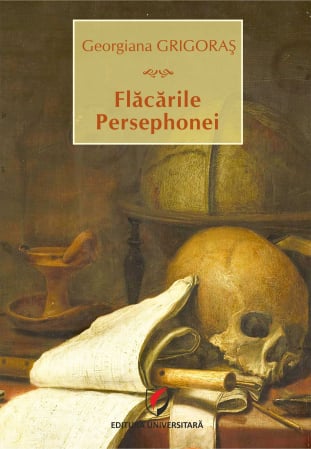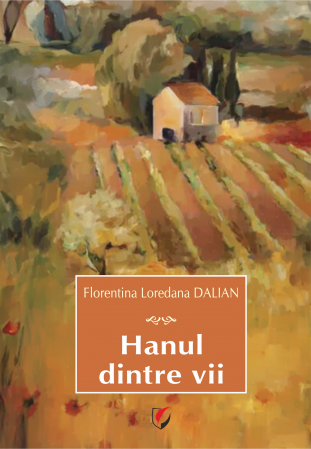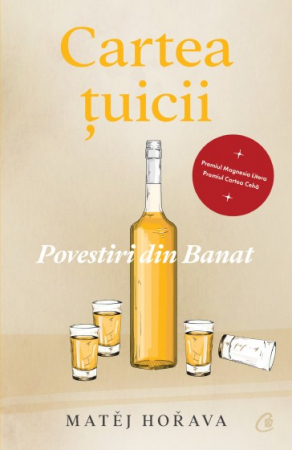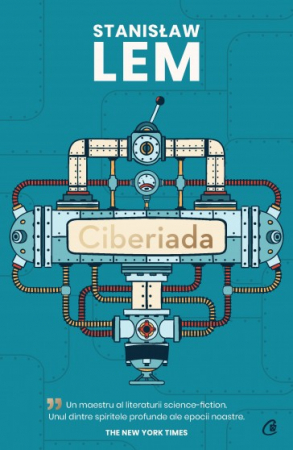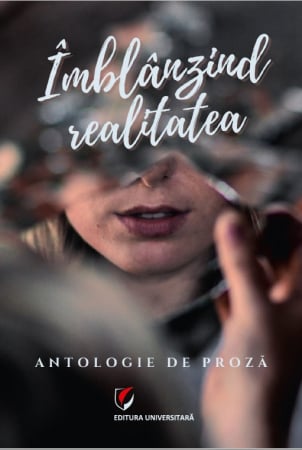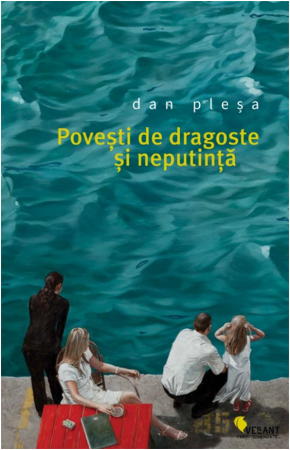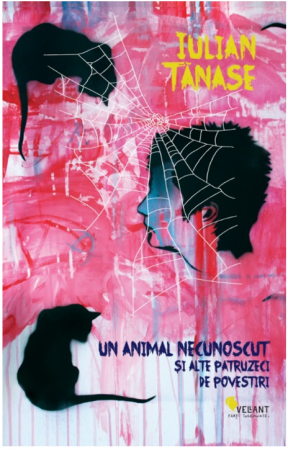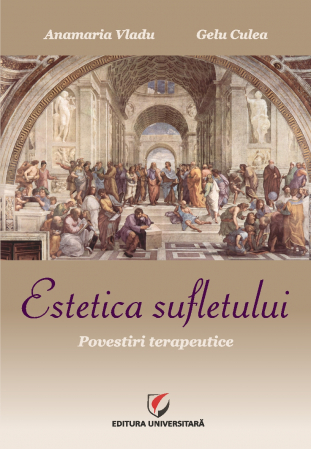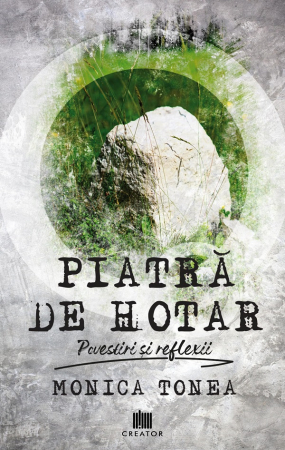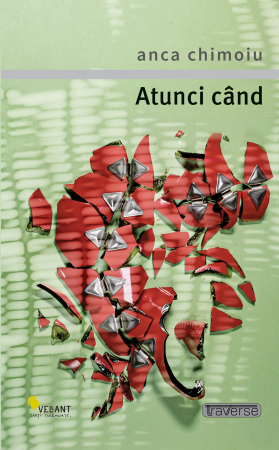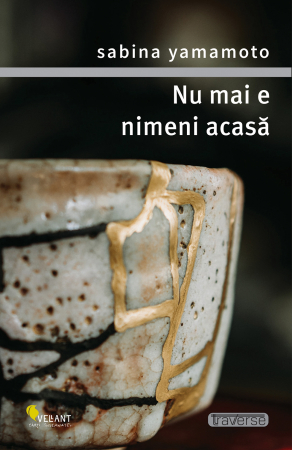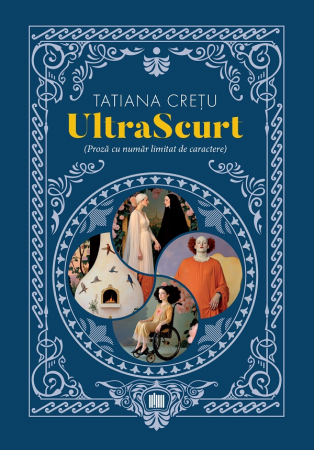Manuscript proposals: [email protected] / 0745 204 115 //// Tracking orders Individuals / Sales: 0745 200 357 / Orders Legal entities: 0721 722 783
Volume awarded with the SECOND PRIZE within the Manuscript Contest FULFILL A DREAM - SHORT PROSE section
ISBN: 978-606-28-1305-5
DOI: 10.5682/9786062813055
Publisher year: 2021
Edition: I
Pages: 136
Publisher: Editura Universitară
Author: Codrina Tomov
Product Code:
9786062813055
Do you need help?
0745 200 357
- Description
- Download (1)
- Authors
- Content
- More details
- Reviews (0)
Family dialogue
(between Ildikó Gábos & Serban Foarta)
On a beautiful (but too cold) afternoon in early June, I was reading Codrina's prose "in pencil and paper" and ... I was laughing. Intrigued by the great joy in the next room, my consort, Serban, enters.
S: What are you doing?
Me: I write.
S: What do you write?
Me: The preface.
S: How so? Did you also start literary criticism?
Me: I do not. But this book by Codrina is surprisingly captivating! Not for nothing did she win that award!
S: What award?
Me: She participated in the contest "Fulfill a Dream", launched by the Editura Universitara in Bucharest, winning the second prize in the "Short Prose" section.
S: From what I see, Codrina is always surprising. Not long ago, she surprised us with her painting.
Me: ... and now, with these short, even ultra-short prose. As for her paintings, "this is another story", to evoke the leitmotif with which many of her prose ends. As he told me, he kept drawing with great pleasure until he was five or six years old, but then he reinvented himself. He resumed the brush relatively recently, after a one-day intuitive painting course with Gina Dragomir. Then, I quote from it, “I took weekly painting classes for amateurs, with professional artists Dana Simionescu and Andrei Marian Moga, in the last two years. I also participated in two group exhibitions, with colleagues ... ”Take a look at her FB page, to see how successful they are! Composition, color, style, and others. You would know how to say more.
S: And she would know more to say, because not all painters know how to do it; proof - comments, more or less flattering to my own paintings. I look at a small reproduction album of Codrina and I am more and more delighted by her compositions. It's true, their own regime is eclectic, as is normal on the first steps of the ladder. Eclectic, but with an accentuated personal note when the composition is not one imposed by canons, but free, empathetic, spontaneous.
Me: She paints more portraits than landscapes. However, the human figure always appears in her paintings.
S: These paintings can be taxed, in some places, as expressionist, or, on the contrary, enchanting, by an imponderable, diaphanous orphism, to the sagalnic Chagall or to Marie Laurencin, one of Apollinaire's muses.
Me: I mean, especially girls with nose in the wind, with hair in the wind, with forest hair, singable and green, with flower tiaras ... In fact, a series of her stories are really a gallery of portraits. Painter's eyes, writer's hand I would say.
S: And vice versa, if you don't mind!
Me: Let me tell you a few of these. Betty, the slut of Arad Miniona, thin, oxygenated, cut and styled according to the fashion of the time, lipstick shrill and with deep wrinkles at the corners of the small and oblique eyes, with a bird profile - vaguely crooked nose and almost non-existent chin - did not look like a diva through whose bed armies passed. And who knows how sexy she was, or vulgar, or interesting at least. In the summer, he always wore white pants molded on the small and bulging backside, T-shirts from the package, low-cut, and heels.
S: Almost a Miss Huss, if not a Feathered Feather.
Me: Or our Sanda with luggage: If I remember Sanda and her nets? How could I not remember? I also knew her, as the whole of Arad knew her: small in stature, with curly hair, dyed black, over which, in winter, she pulled a kind of beret of the same color. Was she old or not? I do not know anymore. The young woman, however, was not.
S: As far as I can see, the natural compassion towards such "falls" is difficult, as if, to manifest itself, due to their grotesque condition.
Me: Or Her name was Lady: Olga, on the other hand, looked good: at the age of 57, she still had a thin, adolescent waist, and she knew how to subtly accentuate it with a simple cord, the indispensable accessory of the gown sewn in town after a sketch conceived by herself. The rules of the dispensary said nothing about tailoring, so the pediatrician had ordered some of her robes with tweezers, a Russian collar, and a lap just above her beautiful, well-turned knees. Strongly powdered, the round cheek cleverly concealed its eggplant hue acquired over time, and the expressive black eyes were artistically outlined with dermatograph in tune with the mascara that drove away her eyelashes. A red lipstick, bold, of very good quality, covered the full lips, from under which two small and slightly sharp rows of teeth protruded. He used the foundation applied with the spatula only sometimes, when he had to cover his occasional bruises, and the concealer solved quite successfully the bags under the eyes, more and more obvious. In her platinum, bob-cut hair, she had put on a colorful natural silk headband.
S: Accuracy and bitterness!
Me: Or Angelica: It was a beautiful gypsy fire, beautiful and thawed. He had an olive complexion, delicate bones, and incredibly bright blue eyes, draped in black eyelashes, thick and turned like porcelain dolls. Unreal, just like the smile with a thousand small pearls in the shape of teeth. He was selling flowers. Or begging.
S: I also saw such an adorable and pubescent gypsy, about 40 years ago, on the steps of a low-profile cinema, Art. There were several of us who, looking at her, found it hard to get out of place ... But back to the short. It was as if you were going to give this "long" title to a volume of yours, a bit like a project!
Me: Yes and I'm glad she, Codrina, didn't give it to her book.
S: Would you have been jealous?
Me: Somehow, because her prose is worthy of envy, suitable for this title.
S: Speaking of (ultra) short, we had an uncle who told us that the joke must meet two conditions: short and with a good point. Usually, it's the other way around and some pull on them until they blow the point.
Me: These prose meet both criteria, without being jokes, although they have a lot of humor and a point. Let me read, for example, Green with Glitter!
S: Ha-ha, more than in Caragiale, maser!
Me: And that's still nothing. You, who are a donkey of the Romanian language, do you know what raduc means?
S: Raduc ?? I don't ... remember! Let me search.
Me: Stop looking! You better read the two stories about raduc and you will find out. Wait, let me read your essentials, that is, the "point."
S: Better not, because you take the tip from the reader's mouth!
Me: Okay, if you say so ... Then there are some funny blunders and stutters in the story of the same name.
S: Speaking of stuttering: the miners in a novel by Agarbiceanu are afraid of what they call the "bath valve". This is, perhaps, the alarming manifestation of the killer semolina. If you keep talking about stuttering, here is a chiasm of the previous expression: "stuttering the valley". And if it were a stutter, it would be good, because it would, in fact, be "missed". Codrina has "bad eyes" or, rather, "bad ear", because nothing escapes her from the cacophony of the world!
Me: Really. Nor the various events, real or imaginary, short, with unexpected twists and sharp point.
S: You're right: there are also blunt points. Me: Hers are definitely not bland! S: Thank you very much.
Me: I would give you just one example: the miraculous and scientifically proven transformation, through an apocryphal press article, that is false, in How to change brandy into water.
S: If it were wine, not brandy, we would witness an embarrassing miss of the miracle at the Wedding in Cana.
Me: Now it's my turn, not to take the point from your mouth, but the daily bread, reminiscent of the great linguistic "vase", alive, colorful, with an unspeakable flavor, a mixture of Banatisms, Bulgarisms and Transylvanians: jeb, clop, stelaj, bumbi, mifca, o taricana, mnogo vnimatelna ...
S: The proci, the proci.
Me: Now that it's done TOMORROW, let's let the reader understand the rest, even talk about the book.
S: If he has anyone.
(between Ildikó Gábos & Serban Foarta)
On a beautiful (but too cold) afternoon in early June, I was reading Codrina's prose "in pencil and paper" and ... I was laughing. Intrigued by the great joy in the next room, my consort, Serban, enters.
S: What are you doing?
Me: I write.
S: What do you write?
Me: The preface.
S: How so? Did you also start literary criticism?
Me: I do not. But this book by Codrina is surprisingly captivating! Not for nothing did she win that award!
S: What award?
Me: She participated in the contest "Fulfill a Dream", launched by the Editura Universitara in Bucharest, winning the second prize in the "Short Prose" section.
S: From what I see, Codrina is always surprising. Not long ago, she surprised us with her painting.
Me: ... and now, with these short, even ultra-short prose. As for her paintings, "this is another story", to evoke the leitmotif with which many of her prose ends. As he told me, he kept drawing with great pleasure until he was five or six years old, but then he reinvented himself. He resumed the brush relatively recently, after a one-day intuitive painting course with Gina Dragomir. Then, I quote from it, “I took weekly painting classes for amateurs, with professional artists Dana Simionescu and Andrei Marian Moga, in the last two years. I also participated in two group exhibitions, with colleagues ... ”Take a look at her FB page, to see how successful they are! Composition, color, style, and others. You would know how to say more.
S: And she would know more to say, because not all painters know how to do it; proof - comments, more or less flattering to my own paintings. I look at a small reproduction album of Codrina and I am more and more delighted by her compositions. It's true, their own regime is eclectic, as is normal on the first steps of the ladder. Eclectic, but with an accentuated personal note when the composition is not one imposed by canons, but free, empathetic, spontaneous.
Me: She paints more portraits than landscapes. However, the human figure always appears in her paintings.
S: These paintings can be taxed, in some places, as expressionist, or, on the contrary, enchanting, by an imponderable, diaphanous orphism, to the sagalnic Chagall or to Marie Laurencin, one of Apollinaire's muses.
Me: I mean, especially girls with nose in the wind, with hair in the wind, with forest hair, singable and green, with flower tiaras ... In fact, a series of her stories are really a gallery of portraits. Painter's eyes, writer's hand I would say.
S: And vice versa, if you don't mind!
Me: Let me tell you a few of these. Betty, the slut of Arad Miniona, thin, oxygenated, cut and styled according to the fashion of the time, lipstick shrill and with deep wrinkles at the corners of the small and oblique eyes, with a bird profile - vaguely crooked nose and almost non-existent chin - did not look like a diva through whose bed armies passed. And who knows how sexy she was, or vulgar, or interesting at least. In the summer, he always wore white pants molded on the small and bulging backside, T-shirts from the package, low-cut, and heels.
S: Almost a Miss Huss, if not a Feathered Feather.
Me: Or our Sanda with luggage: If I remember Sanda and her nets? How could I not remember? I also knew her, as the whole of Arad knew her: small in stature, with curly hair, dyed black, over which, in winter, she pulled a kind of beret of the same color. Was she old or not? I do not know anymore. The young woman, however, was not.
S: As far as I can see, the natural compassion towards such "falls" is difficult, as if, to manifest itself, due to their grotesque condition.
Me: Or Her name was Lady: Olga, on the other hand, looked good: at the age of 57, she still had a thin, adolescent waist, and she knew how to subtly accentuate it with a simple cord, the indispensable accessory of the gown sewn in town after a sketch conceived by herself. The rules of the dispensary said nothing about tailoring, so the pediatrician had ordered some of her robes with tweezers, a Russian collar, and a lap just above her beautiful, well-turned knees. Strongly powdered, the round cheek cleverly concealed its eggplant hue acquired over time, and the expressive black eyes were artistically outlined with dermatograph in tune with the mascara that drove away her eyelashes. A red lipstick, bold, of very good quality, covered the full lips, from under which two small and slightly sharp rows of teeth protruded. He used the foundation applied with the spatula only sometimes, when he had to cover his occasional bruises, and the concealer solved quite successfully the bags under the eyes, more and more obvious. In her platinum, bob-cut hair, she had put on a colorful natural silk headband.
S: Accuracy and bitterness!
Me: Or Angelica: It was a beautiful gypsy fire, beautiful and thawed. He had an olive complexion, delicate bones, and incredibly bright blue eyes, draped in black eyelashes, thick and turned like porcelain dolls. Unreal, just like the smile with a thousand small pearls in the shape of teeth. He was selling flowers. Or begging.
S: I also saw such an adorable and pubescent gypsy, about 40 years ago, on the steps of a low-profile cinema, Art. There were several of us who, looking at her, found it hard to get out of place ... But back to the short. It was as if you were going to give this "long" title to a volume of yours, a bit like a project!
Me: Yes and I'm glad she, Codrina, didn't give it to her book.
S: Would you have been jealous?
Me: Somehow, because her prose is worthy of envy, suitable for this title.
S: Speaking of (ultra) short, we had an uncle who told us that the joke must meet two conditions: short and with a good point. Usually, it's the other way around and some pull on them until they blow the point.
Me: These prose meet both criteria, without being jokes, although they have a lot of humor and a point. Let me read, for example, Green with Glitter!
S: Ha-ha, more than in Caragiale, maser!
Me: And that's still nothing. You, who are a donkey of the Romanian language, do you know what raduc means?
S: Raduc ?? I don't ... remember! Let me search.
Me: Stop looking! You better read the two stories about raduc and you will find out. Wait, let me read your essentials, that is, the "point."
S: Better not, because you take the tip from the reader's mouth!
Me: Okay, if you say so ... Then there are some funny blunders and stutters in the story of the same name.
S: Speaking of stuttering: the miners in a novel by Agarbiceanu are afraid of what they call the "bath valve". This is, perhaps, the alarming manifestation of the killer semolina. If you keep talking about stuttering, here is a chiasm of the previous expression: "stuttering the valley". And if it were a stutter, it would be good, because it would, in fact, be "missed". Codrina has "bad eyes" or, rather, "bad ear", because nothing escapes her from the cacophony of the world!
Me: Really. Nor the various events, real or imaginary, short, with unexpected twists and sharp point.
S: You're right: there are also blunt points. Me: Hers are definitely not bland! S: Thank you very much.
Me: I would give you just one example: the miraculous and scientifically proven transformation, through an apocryphal press article, that is false, in How to change brandy into water.
S: If it were wine, not brandy, we would witness an embarrassing miss of the miracle at the Wedding in Cana.
Me: Now it's my turn, not to take the point from your mouth, but the daily bread, reminiscent of the great linguistic "vase", alive, colorful, with an unspeakable flavor, a mixture of Banatisms, Bulgarisms and Transylvanians: jeb, clop, stelaj, bumbi, mifca, o taricana, mnogo vnimatelna ...
S: The proci, the proci.
Me: Now that it's done TOMORROW, let's let the reader understand the rest, even talk about the book.
S: If he has anyone.
-
The day that never comes is called tomorrow
Download
CODRINA TOMOV was born in 1968 in Arad and grew up in the Old House in the center. Since 1991, he has lived in Timisoara, where he currently works as a journalist for the regional daily The Banat renaissance, in the pages of which he publishes daily articles in the cultural field. She lives surrounded by ... cats, three in number, and books, many, many thousands of books. When he doesn't read, he writes, and when he doesn't write, he paints. He does all this because he loves with passion the living stories, the good stories, told, written or painted on canvas. She is still looking for the most beautiful story in the world, and this is her debut book, on the cover of which sleeps an angel also painted by her. Be careful, you might wake him up ...
Family dialogue (between Ildikó Gábos & Serban Foarta) / 7
1. The most beautiful story in the world / 13
2. Darling, darling, ugly ... / 17
3. The old house in the center / 20
4. "A good and fatty soup, as I like it ..." / 23
5. American girl / 27
6. Angelica / 29
7. Betty, the bitch of Arad / 31
8. Lenuta / 33
9. Montili wants to die / 36
10. Erzsi and Bezsi, from the train ... / 39
11. She was called Lady / 42
12. Sorel Nestor, economist / 46
13. Our baggage with luggage / 53
14. Green, with glitter / 55
15. Geography teacher / 59
16. The skeleton with the basque / 63
17. Have you ever seen a cow? / 67
18. Blunders are like misfortunes / 72
19. Mom and dad drink like pigs / 74
20. Saving poetry / 78
21. Preschoolers have no logic / 81
22. A simple quote, at the right time / 83
23. The day that never comes is also called tomorrow / 85
24. „Infantamargarita” / 87
25. What's that ... anti-Roman? / 90
26. Do not lose sight of the public / 93
27. Pipidoli, Mipidoli / 96
28. Baci Nica pajamas / 99
29. Popa Toager from Pamuca / 104
30. Candy. For horses, for children / 108
31. How to turn brandy into water / 110
32. At the Poplar Fountain, of course ... / 113
33. The power of positive thinking / 115
34. Raduc / 117
35. Neither in DEX, nor in DOOM / 120
36. Do you like quince compote? / 123
37. Stammering ... / 126
38. What does the cat eat? / 128
39. Merlin's wishes / 131
40. The other geography / 134
1. The most beautiful story in the world / 13
2. Darling, darling, ugly ... / 17
3. The old house in the center / 20
4. "A good and fatty soup, as I like it ..." / 23
5. American girl / 27
6. Angelica / 29
7. Betty, the bitch of Arad / 31
8. Lenuta / 33
9. Montili wants to die / 36
10. Erzsi and Bezsi, from the train ... / 39
11. She was called Lady / 42
12. Sorel Nestor, economist / 46
13. Our baggage with luggage / 53
14. Green, with glitter / 55
15. Geography teacher / 59
16. The skeleton with the basque / 63
17. Have you ever seen a cow? / 67
18. Blunders are like misfortunes / 72
19. Mom and dad drink like pigs / 74
20. Saving poetry / 78
21. Preschoolers have no logic / 81
22. A simple quote, at the right time / 83
23. The day that never comes is also called tomorrow / 85
24. „Infantamargarita” / 87
25. What's that ... anti-Roman? / 90
26. Do not lose sight of the public / 93
27. Pipidoli, Mipidoli / 96
28. Baci Nica pajamas / 99
29. Popa Toager from Pamuca / 104
30. Candy. For horses, for children / 108
31. How to turn brandy into water / 110
32. At the Poplar Fountain, of course ... / 113
33. The power of positive thinking / 115
34. Raduc / 117
35. Neither in DEX, nor in DOOM / 120
36. Do you like quince compote? / 123
37. Stammering ... / 126
38. What does the cat eat? / 128
39. Merlin's wishes / 131
40. The other geography / 134
Family dialogue
(between Ildikó Gábos & Serban Foarta)
On a beautiful (but too cold) afternoon in early June, I was reading Codrina's prose "in pencil and paper" and ... I was laughing. Intrigued by the great joy in the next room, my consort, Serban, enters.
S: What are you doing?
Me: I write.
S: What do you write?
Me: The preface.
S: How so? Did you also start literary criticism?
Me: I do not. But this book by Codrina is surprisingly captivating! Not for nothing did she win that award!
S: What award?
Me: She participated in the contest "Fulfill a Dream", launched by the Editura Universitara in Bucharest, winning the second prize in the "Short Prose" section.
S: From what I see, Codrina is always surprising. Not long ago, she surprised us with her painting.
Me: ... and now, with these short, even ultra-short prose. As for her paintings, "this is another story", to evoke the leitmotif with which many of her prose ends. As he told me, he kept drawing with great pleasure until he was five or six years old, but then he reinvented himself. He resumed the brush relatively recently, after a one-day intuitive painting course with Gina Dragomir. Then, I quote from it, “I took weekly painting classes for amateurs, with professional artists Dana Simionescu and Andrei Marian Moga, in the last two years. I also participated in two group exhibitions, with colleagues ... ”Take a look at her FB page, to see how successful they are! Composition, color, style, and others. You would know how to say more.
S: And she would know more to say, because not all painters know how to do it; proof - comments, more or less flattering to my own paintings. I look at a small reproduction album of Codrina and I am more and more delighted by her compositions. It's true, their own regime is eclectic, as is normal on the first steps of the ladder. Eclectic, but with an accentuated personal note when the composition is not one imposed by canons, but free, empathetic, spontaneous.
Me: She paints more portraits than landscapes. However, the human figure always appears in her paintings.
S: These paintings can be taxed, in some places, as expressionist, or, on the contrary, enchanting, by an imponderable, diaphanous orphism, to the sagalnic Chagall or to Marie Laurencin, one of Apollinaire's muses.
Me: I mean, especially girls with nose in the wind, with hair in the wind, with forest hair, singable and green, with flower tiaras ... In fact, a series of her stories are really a gallery of portraits. Painter's eyes, writer's hand I would say.
S: And vice versa, if you don't mind!
Me: Let me tell you a few of these. Betty, the slut of Arad Miniona, thin, oxygenated, cut and styled according to the fashion of the time, lipstick shrill and with deep wrinkles at the corners of the small and oblique eyes, with a bird profile - vaguely crooked nose and almost non-existent chin - did not look like a diva through whose bed armies passed. And who knows how sexy she was, or vulgar, or interesting at least. In the summer, he always wore white pants molded on the small and bulging backside, T-shirts from the package, low-cut, and heels.
S: Almost a Miss Huss, if not a Feathered Feather.
Me: Or our Sanda with luggage: If I remember Sanda and her nets? How could I not remember? I also knew her, as the whole of Arad knew her: small in stature, with curly hair, dyed black, over which, in winter, she pulled a kind of beret of the same color. Was she old or not? I do not know anymore. The young woman, however, was not.
S: As far as I can see, the natural compassion towards such "falls" is difficult, as if, to manifest itself, due to their grotesque condition.
Me: Or Her name was Lady: Olga, on the other hand, looked good: at the age of 57, she still had a thin, adolescent waist, and she knew how to subtly accentuate it with a simple cord, the indispensable accessory of the gown sewn in town after a sketch conceived by herself. The rules of the dispensary said nothing about tailoring, so the pediatrician had ordered some of her robes with tweezers, a Russian collar, and a lap just above her beautiful, well-turned knees. Strongly powdered, the round cheek cleverly concealed its eggplant hue acquired over time, and the expressive black eyes were artistically outlined with dermatograph in tune with the mascara that drove away her eyelashes. A red lipstick, bold, of very good quality, covered the full lips, from under which two small and slightly sharp rows of teeth protruded. He used the foundation applied with the spatula only sometimes, when he had to cover his occasional bruises, and the concealer solved quite successfully the bags under the eyes, more and more obvious. In her platinum, bob-cut hair, she had put on a colorful natural silk headband.
S: Accuracy and bitterness!
Me: Or Angelica: It was a beautiful gypsy fire, beautiful and thawed. He had an olive complexion, delicate bones, and incredibly bright blue eyes, draped in black eyelashes, thick and turned like porcelain dolls. Unreal, just like the smile with a thousand small pearls in the shape of teeth. He was selling flowers. Or begging.
S: I also saw such an adorable and pubescent gypsy, about 40 years ago, on the steps of a low-profile cinema, Art. There were several of us who, looking at her, found it hard to get out of place ... But back to the short. It was as if you were going to give this "long" title to a volume of yours, a bit like a project!
Me: Yes and I'm glad she, Codrina, didn't give it to her book.
S: Would you have been jealous?
Me: Somehow, because her prose is worthy of envy, suitable for this title.
S: Speaking of (ultra) short, we had an uncle who told us that the joke must meet two conditions: short and with a good point. Usually, it's the other way around and some pull on them until they blow the point.
Me: These prose meet both criteria, without being jokes, although they have a lot of humor and a point. Let me read, for example, Green with Glitter!
S: Ha-ha, more than in Caragiale, maser!
Me: And that's still nothing. You, who are a donkey of the Romanian language, do you know what raduc means?
S: Raduc ?? I don't ... remember! Let me search.
Me: Stop looking! You better read the two stories about raduc and you will find out. Wait, let me read your essentials, that is, the "point."
S: Better not, because you take the tip from the reader's mouth!
Me: Okay, if you say so ... Then there are some funny blunders and stutters in the story of the same name.
S: Speaking of stuttering: the miners in a novel by Agarbiceanu are afraid of what they call the "bath valve". This is, perhaps, the alarming manifestation of the killer semolina. If you keep talking about stuttering, here is a chiasm of the previous expression: "stuttering the valley". And if it were a stutter, it would be good, because it would, in fact, be "missed". Codrina has "bad eyes" or, rather, "bad ear", because nothing escapes her from the cacophony of the world!
Me: Really. Nor the various events, real or imaginary, short, with unexpected twists and sharp point.
S: You're right: there are also blunt points. Me: Hers are definitely not bland! S: Thank you very much.
Me: I would give you just one example: the miraculous and scientifically proven transformation, through an apocryphal press article, that is false, in How to change brandy into water.
S: If it were wine, not brandy, we would witness an embarrassing miss of the miracle at the Wedding in Cana.
Me: Now it's my turn, not to take the point from your mouth, but the daily bread, reminiscent of the great linguistic "vase", alive, colorful, with an unspeakable flavor, a mixture of Banatisms, Bulgarisms and Transylvanians: jeb, clop, stelaj, bumbi, mifca, o taricana, mnogo vnimatelna ...
S: The proci, the proci.
Me: Now that it's done TOMORROW, let's let the reader understand the rest, even talk about the book.
S: If he has anyone.
(between Ildikó Gábos & Serban Foarta)
On a beautiful (but too cold) afternoon in early June, I was reading Codrina's prose "in pencil and paper" and ... I was laughing. Intrigued by the great joy in the next room, my consort, Serban, enters.
S: What are you doing?
Me: I write.
S: What do you write?
Me: The preface.
S: How so? Did you also start literary criticism?
Me: I do not. But this book by Codrina is surprisingly captivating! Not for nothing did she win that award!
S: What award?
Me: She participated in the contest "Fulfill a Dream", launched by the Editura Universitara in Bucharest, winning the second prize in the "Short Prose" section.
S: From what I see, Codrina is always surprising. Not long ago, she surprised us with her painting.
Me: ... and now, with these short, even ultra-short prose. As for her paintings, "this is another story", to evoke the leitmotif with which many of her prose ends. As he told me, he kept drawing with great pleasure until he was five or six years old, but then he reinvented himself. He resumed the brush relatively recently, after a one-day intuitive painting course with Gina Dragomir. Then, I quote from it, “I took weekly painting classes for amateurs, with professional artists Dana Simionescu and Andrei Marian Moga, in the last two years. I also participated in two group exhibitions, with colleagues ... ”Take a look at her FB page, to see how successful they are! Composition, color, style, and others. You would know how to say more.
S: And she would know more to say, because not all painters know how to do it; proof - comments, more or less flattering to my own paintings. I look at a small reproduction album of Codrina and I am more and more delighted by her compositions. It's true, their own regime is eclectic, as is normal on the first steps of the ladder. Eclectic, but with an accentuated personal note when the composition is not one imposed by canons, but free, empathetic, spontaneous.
Me: She paints more portraits than landscapes. However, the human figure always appears in her paintings.
S: These paintings can be taxed, in some places, as expressionist, or, on the contrary, enchanting, by an imponderable, diaphanous orphism, to the sagalnic Chagall or to Marie Laurencin, one of Apollinaire's muses.
Me: I mean, especially girls with nose in the wind, with hair in the wind, with forest hair, singable and green, with flower tiaras ... In fact, a series of her stories are really a gallery of portraits. Painter's eyes, writer's hand I would say.
S: And vice versa, if you don't mind!
Me: Let me tell you a few of these. Betty, the slut of Arad Miniona, thin, oxygenated, cut and styled according to the fashion of the time, lipstick shrill and with deep wrinkles at the corners of the small and oblique eyes, with a bird profile - vaguely crooked nose and almost non-existent chin - did not look like a diva through whose bed armies passed. And who knows how sexy she was, or vulgar, or interesting at least. In the summer, he always wore white pants molded on the small and bulging backside, T-shirts from the package, low-cut, and heels.
S: Almost a Miss Huss, if not a Feathered Feather.
Me: Or our Sanda with luggage: If I remember Sanda and her nets? How could I not remember? I also knew her, as the whole of Arad knew her: small in stature, with curly hair, dyed black, over which, in winter, she pulled a kind of beret of the same color. Was she old or not? I do not know anymore. The young woman, however, was not.
S: As far as I can see, the natural compassion towards such "falls" is difficult, as if, to manifest itself, due to their grotesque condition.
Me: Or Her name was Lady: Olga, on the other hand, looked good: at the age of 57, she still had a thin, adolescent waist, and she knew how to subtly accentuate it with a simple cord, the indispensable accessory of the gown sewn in town after a sketch conceived by herself. The rules of the dispensary said nothing about tailoring, so the pediatrician had ordered some of her robes with tweezers, a Russian collar, and a lap just above her beautiful, well-turned knees. Strongly powdered, the round cheek cleverly concealed its eggplant hue acquired over time, and the expressive black eyes were artistically outlined with dermatograph in tune with the mascara that drove away her eyelashes. A red lipstick, bold, of very good quality, covered the full lips, from under which two small and slightly sharp rows of teeth protruded. He used the foundation applied with the spatula only sometimes, when he had to cover his occasional bruises, and the concealer solved quite successfully the bags under the eyes, more and more obvious. In her platinum, bob-cut hair, she had put on a colorful natural silk headband.
S: Accuracy and bitterness!
Me: Or Angelica: It was a beautiful gypsy fire, beautiful and thawed. He had an olive complexion, delicate bones, and incredibly bright blue eyes, draped in black eyelashes, thick and turned like porcelain dolls. Unreal, just like the smile with a thousand small pearls in the shape of teeth. He was selling flowers. Or begging.
S: I also saw such an adorable and pubescent gypsy, about 40 years ago, on the steps of a low-profile cinema, Art. There were several of us who, looking at her, found it hard to get out of place ... But back to the short. It was as if you were going to give this "long" title to a volume of yours, a bit like a project!
Me: Yes and I'm glad she, Codrina, didn't give it to her book.
S: Would you have been jealous?
Me: Somehow, because her prose is worthy of envy, suitable for this title.
S: Speaking of (ultra) short, we had an uncle who told us that the joke must meet two conditions: short and with a good point. Usually, it's the other way around and some pull on them until they blow the point.
Me: These prose meet both criteria, without being jokes, although they have a lot of humor and a point. Let me read, for example, Green with Glitter!
S: Ha-ha, more than in Caragiale, maser!
Me: And that's still nothing. You, who are a donkey of the Romanian language, do you know what raduc means?
S: Raduc ?? I don't ... remember! Let me search.
Me: Stop looking! You better read the two stories about raduc and you will find out. Wait, let me read your essentials, that is, the "point."
S: Better not, because you take the tip from the reader's mouth!
Me: Okay, if you say so ... Then there are some funny blunders and stutters in the story of the same name.
S: Speaking of stuttering: the miners in a novel by Agarbiceanu are afraid of what they call the "bath valve". This is, perhaps, the alarming manifestation of the killer semolina. If you keep talking about stuttering, here is a chiasm of the previous expression: "stuttering the valley". And if it were a stutter, it would be good, because it would, in fact, be "missed". Codrina has "bad eyes" or, rather, "bad ear", because nothing escapes her from the cacophony of the world!
Me: Really. Nor the various events, real or imaginary, short, with unexpected twists and sharp point.
S: You're right: there are also blunt points. Me: Hers are definitely not bland! S: Thank you very much.
Me: I would give you just one example: the miraculous and scientifically proven transformation, through an apocryphal press article, that is false, in How to change brandy into water.
S: If it were wine, not brandy, we would witness an embarrassing miss of the miracle at the Wedding in Cana.
Me: Now it's my turn, not to take the point from your mouth, but the daily bread, reminiscent of the great linguistic "vase", alive, colorful, with an unspeakable flavor, a mixture of Banatisms, Bulgarisms and Transylvanians: jeb, clop, stelaj, bumbi, mifca, o taricana, mnogo vnimatelna ...
S: The proci, the proci.
Me: Now that it's done TOMORROW, let's let the reader understand the rest, even talk about the book.
S: If he has anyone.
If you want to express your opinion about this product you can add a review.
write a review

6359.png)
![The day that never comes is called tomorrow [1] The day that never comes is called tomorrow [1]](https://gomagcdn.ro/domains/editurauniversitara.ro/files/product/large/ziua-care-nu-mai-vine-niciodata-se-numeste-maine-3326-7818.jpg)
